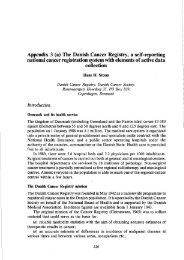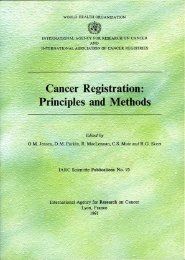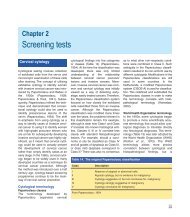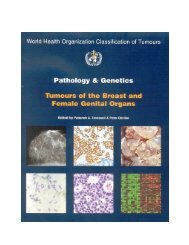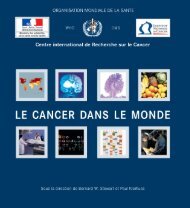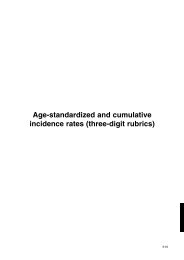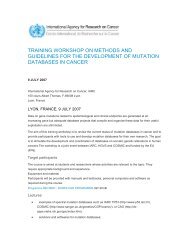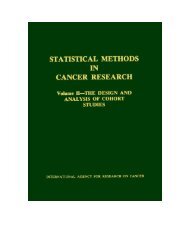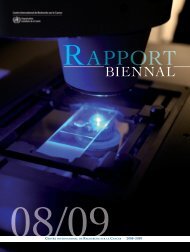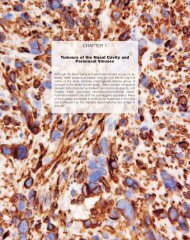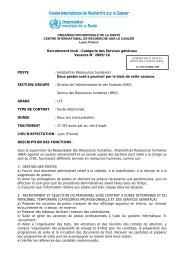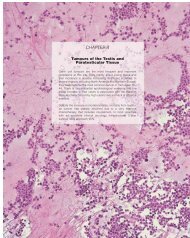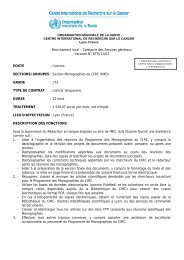world cancer report - iarc
world cancer report - iarc
world cancer report - iarc
You also want an ePaper? Increase the reach of your titles
YUMPU automatically turns print PDFs into web optimized ePapers that Google loves.
tumour cells provides a formidable problem<br />
to development of effective vaccine<br />
therapy. Most of the existing phase III trials<br />
are based on use of whole cell or<br />
lysates of whole cells and were initiated<br />
before some of the more recent concepts<br />
in tumour immunology were known. The<br />
results of three randomized trials in<br />
patients with melanoma have shown no<br />
substantial benefit from vaccine therapy<br />
but several major studies have yet to be<br />
completed. The advent of many “start-up”<br />
biotechnology companies and new information<br />
about <strong>cancer</strong> antigens has generated<br />
many new approaches in <strong>cancer</strong> vaccine<br />
therapy, particularly in the use of<br />
dendritic cell vaccines. The next few years<br />
promise therefore to be an exciting period<br />
in the evolution of immunotherapy.<br />
HORMONAL THERAPY<br />
Adjuvant endocrine therapy is a standard<br />
component in the management of<br />
REFERENCES<br />
1. Early Breast Cancer Trialists' Collaborative Group<br />
(1992) Systemic treatment of early breast <strong>cancer</strong> by hormonal,<br />
cytotoxic, or immune therapy. 133 randomised trials<br />
involving 31,000 recurrences and 24,000 deaths among<br />
75,000 women. Lancet, 339: 71-85.<br />
2. NCI/ASCO (1998) Integrating economic analysis into<br />
<strong>cancer</strong> clinical trials: the National Cancer Institute-<br />
American Society of Clinical Oncology Economics<br />
Workbook. J Natl Cancer Inst Monogr, 1-28.<br />
3. Sikora K, Advani S, Koroltchouk V, Magrath I, Levy L,<br />
Pinedo H, Schwartsmann G, Tattersall M, Yan S (1999)<br />
Essential drugs for <strong>cancer</strong> therapy: a World Health<br />
Organization consultation. Ann Oncol, 10: 385-390.<br />
4. McGuire W, Neugut AI, Arikian S, Doyle J, Dezii CM<br />
(1997) Analysis of the cost-effectiveness of paclitaxel as<br />
alternative combination therapy for advanced ovarian <strong>cancer</strong>.<br />
J Clin Oncol, 15: 640-645.<br />
5. Sikora K (1999) Developing a global strategy for <strong>cancer</strong>.<br />
Eur J Cancer, 35: 24-31.<br />
6. Sikora K (1998) Cancer. In: Marinker M, Peckham,M<br />
eds, Clinical futures, London, BMJ Books, 74-95.<br />
7. Hersey P (2003) Principles in immunotherapy of<br />
melanoma. In: Thompson JF, Morton DL, Kroon, BBR eds,<br />
Textbook of Melanoma: Pathology, Diagnosis and<br />
Management, Martin Dunitz.<br />
8. Lanzavecchia A (1998) Immunology. Licence to kill.<br />
Nature, 393: 413-414.<br />
tumours of the breast and prostate gland.<br />
In breast <strong>cancer</strong>, anti-estrogenic treatment<br />
is recommended for all postmenopausal<br />
women with newly-diagnosed<br />
metastatic disease if the tumour biopsy<br />
shows evidence of estrogen receptor (ER)<br />
or progesterone receptor (PR) expression.<br />
Similarly, this treatment is given if the<br />
receptor status is unknown, whereas<br />
ER/PR-negative carcinomas are not treated<br />
since they cannot be expected to<br />
respond. For many years, tamoxifen has<br />
been the drug of choice as many clinical<br />
trials have shown that it significantly<br />
increases progression-free survival; it may<br />
also prevent or delay the development of<br />
breast <strong>cancer</strong> in high-risk women [16]. As<br />
second-line treatment, the selective aromatase<br />
inhibitor anastrozole has been<br />
shown to be similarly effective. About onequarter<br />
of breast carcinomas overexpress<br />
the HER2/neu protein (the ERBB2 gene<br />
product) and these may respond to thera-<br />
9. Sotomayor EM, Borrello I, Tubb E, Rattis FM, Bien H, Lu<br />
Z, Fein S, Schoenberger S, Levitsky HI (1999) Conversion<br />
of tumor-specific CD4+ T-cell tolerance to T-cell priming<br />
through in vivo ligation of CD40. Nat Med, 5: 780-787.<br />
10. Diehl L, den Boer AT, Schoenberger SP, van der Voort<br />
EI, Schumacher TN, Melief CJ, Offringa R, Toes RE (1999)<br />
CD40 activation in vivo overcomes peptide-induced peripheral<br />
cytotoxic T-lymphocyte tolerance and augments antitumor<br />
vaccine efficacy. Nat Med, 5: 774-779.<br />
11. Boon T, van der Bruggen P (1996) Human tumor antigens<br />
recognized by T lymphocytes. J Exp Med, 183: 725-<br />
729.<br />
12. Rosenberg SA (1999) A new era for <strong>cancer</strong><br />
immunotherapy based on the genes that encode <strong>cancer</strong><br />
antigens. Immunity, 10: 281-287.<br />
13. Gilboa E (1999) The makings of a tumor rejection antigen.<br />
Immunity, 11: 263-270.<br />
14. Hersey P (2002) Advances in non-surgical treatment<br />
of melanoma. Expert Opin Investig Drugs, 11:75-85.<br />
15. Nguyen T, Thomas WD, Zhang XD, Sanders J, Hersey<br />
P (2000) Immunologically mediated tumor cell apoptosis.<br />
The role of TRAIL in T cell and cytokine mediated responses<br />
to melanoma. Forum (Genova ), 10: 243-252.<br />
16. O'Regan RM, Jordan VC (2002) The evolution of<br />
tamoxifen therapy in breast <strong>cancer</strong>: selective oestrogenreceptor<br />
modulators and downregulators. Lancet Oncol, 3:<br />
207-214.<br />
py with a monoclonal antibody (Herceptin)<br />
that binds to the receptor.<br />
Prostate <strong>cancer</strong> was the first human neoplasm<br />
to be successfully treated with hormonal<br />
therapy, which has been used in the<br />
treatment of advanced disease for more<br />
than six decades. Androgen suppression<br />
may be achieved by luteinizing hormonereleasing<br />
hormone (LHRH) agonists or<br />
surgical orchidectomy. The majority of<br />
patients with metastatic prostate <strong>cancer</strong><br />
show an initial response, often with significant<br />
relief of symptoms, but treatment is<br />
rarely curative and in most cases tumours<br />
become resistant to anti-androgen therapy.<br />
Hormonal therapy, commonly with progestational<br />
agents, is also indicated and<br />
useful in the treatment of metastatic <strong>cancer</strong><br />
of the endometrium, being associated<br />
with significant improvements in survival.<br />
WEBSITES<br />
Drug Information: a guide to prescription and over-thecounter<br />
medications (USA):<br />
http://www.nlm.nih.gov/medlineplus/druginformation.<br />
html<br />
US Food and Drug Administration Oncology Tools website:<br />
http://www.fda.gov/cder/<strong>cancer</strong>/<br />
American Society of Clinical Oncology:<br />
http://www.asco.org<br />
Medical oncology 291



